#and therefore extend some empathy towards them
Explore tagged Tumblr posts
Text
I wish more people put their age on their blogs because at least then I’d know that the horrible post they made was because they are 18 and cringe and not because they just have excruciatingly bad opinions and an inability to critically think
#it would help my sanity to be able to attribute naivety to these kinds of posts#and therefore extend some empathy towards them#rather than get wound up by the sheer stupidity#and lack of awareness#that I see on here EVER DAY
6 notes
·
View notes
Text
Gojo cares a lot, actually
Perspective and empathy in Jujutsu Kaisen
Once again, I see accusations that Gojo only cared about people in relation to their strength. I can't believe that 236 and 261 haven't put this idea to bed already, but let's go over it again for the class. Here are some thoughts on the importance of perspective and empathy in JJK. Spoilers for chapter 266 ahead!
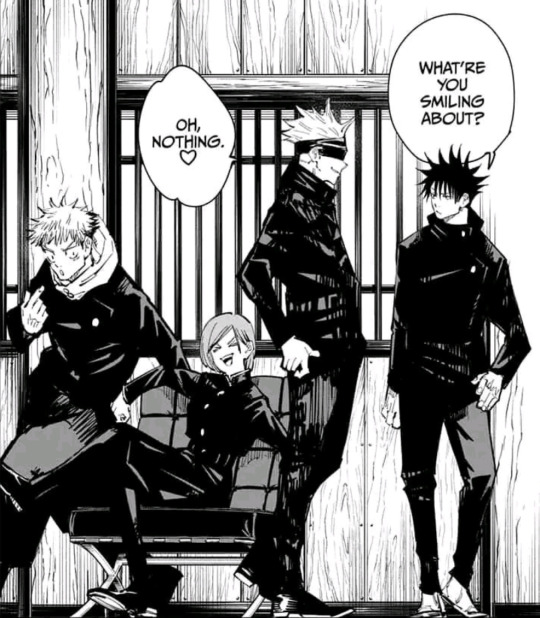
In 236, Gojo tells Geto he loves everyone. This single line, direct from the man's mouth, should be enough. However, moments later, Nanami says, "You never cared about protecting people". So why do some readers only take one of these perspectives at face value?
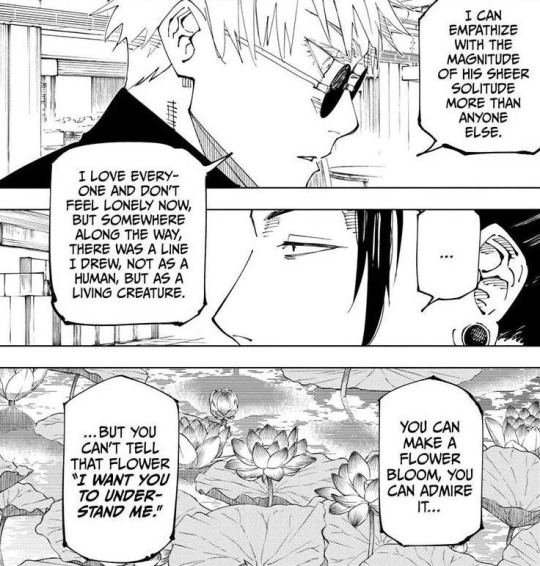
Perspective matters in JJK. Often, characters and even the narrator state things that are only true from their perspective in a given moment. What you choose to believe says more about you than it does about them — an idea I explored in my analysis of 236.
This is particularly important when it comes to Gojo and Megumi, because the moment they meet is the only (?) scene in the whole of JJK that we get to see from two perspectives.
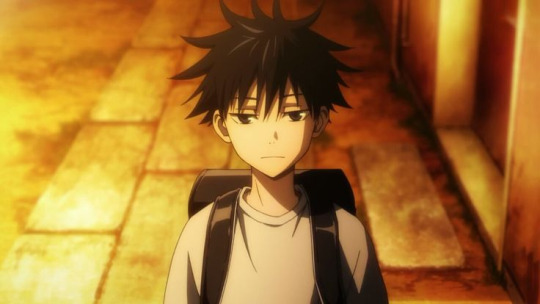

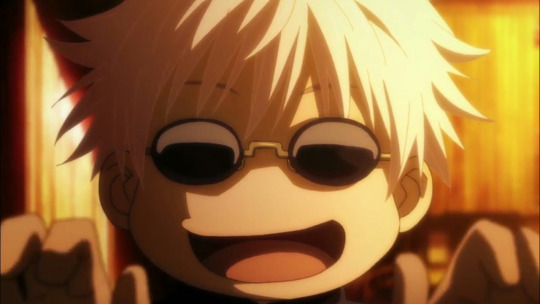
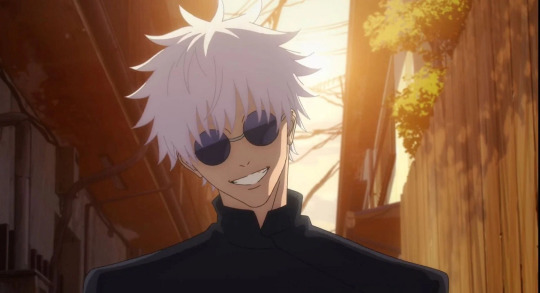
The second time, the reader understands the emotional weight of it for Gojo — but Megumi doesn't. He's kept in the dark, so of course he thinks about their meeting in different terms.
Once again, whose perspective are we going to take at face value? From Megumi's point of view, he wasn't offered a choice. From Gojo's point of view, he extended to a child the little agency available to him.
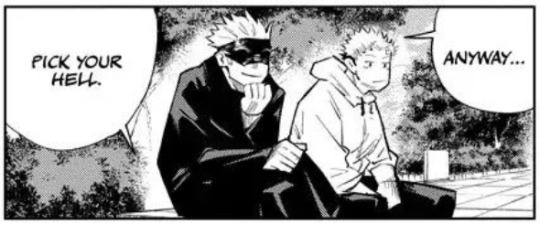
Offering a choice is something Gojo does consistently throughout JJK — pick your hell. It's one of the ways he shows care for others that goes unrecognised, so it's ironic that readers and characters alike misinterpret it for a lack of empathy. However, this is no coincidence.
For much of the series, Gege keeps Gojo at a narrative distance from the reader. Most of what we know about Gojo comes from what other characters tell us, and our view of him is therefore coloured by their perspective.
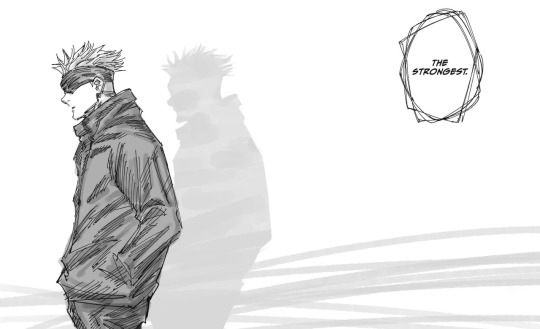
However, while Gojo laments the distance between himself and others, he fails to recognise that he's the one maintaining it — and not because of his strength or his technique. He has admirable goals, but he chooses to work towards them alone.
There are many occasions where characters reach for Gojo, but he refuses to let them past his metaphorical Infinity out of a sense of duty and perhaps misplaced belief that he alone can or should bear this heavy burden.
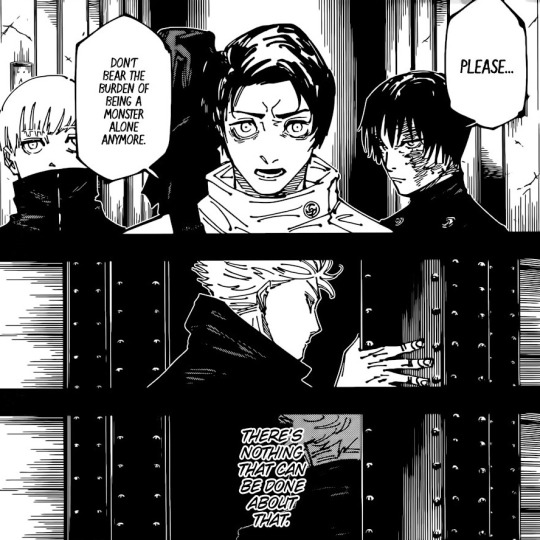
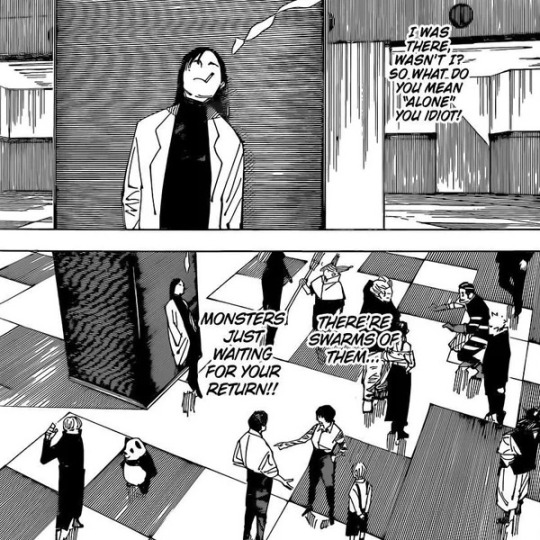
All of Gojo's actions are about preserving the humanity of others at the expense of his own. That's precisely why he chooses to become the "monster" alone. In this way, Gojo is flawed but he isn't uncaring. Again, it's a matter of perspective.
Gojo sees strength as the solution because it's all he's ever known. However, recognising the strength of others doesn't mean that's all he sees — because Gojo knows that dehumanisation acutely. What's more, 261 also suggests he thinks of "strength" in different terms to others.
When they meet, Gojo tells Megumi not to get left behind. However, he later says he was "left behind" when Geto defected. We know Gojo's physical strength eclipsed Geto's, yet Gojo only refers to himself as "the strongest" alone after Geto dies.
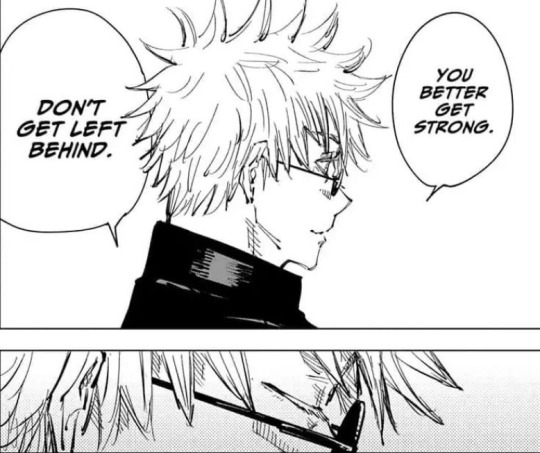
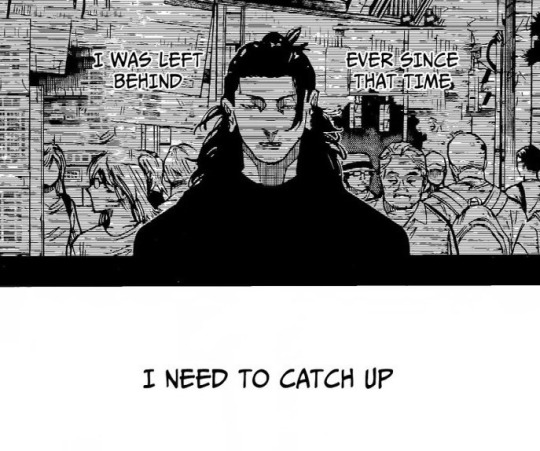
Before that point, there's nothing in the text to suggest that Gojo ever stopped thinking of the pair of them as "the strongest" — as a unit, as a duo. This suggests that strength, for Gojo, is something much more intangible, much more sympathetic, and much more human too.
What do the strongest characters in JJK all have in common? Indomitable will, courage in their convictions, an overwhelming sense of self. Looking at strength through this lens shines a new light on Gojo's goal of raising "strong" allies.
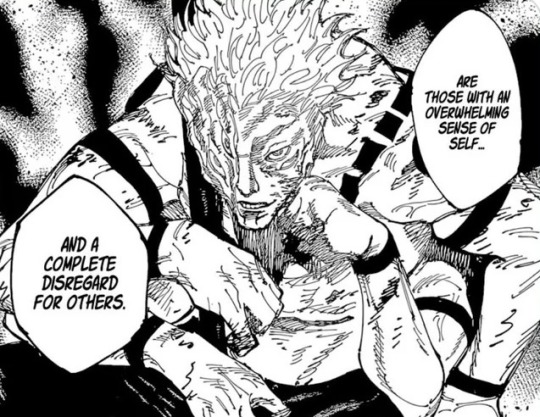
When he forces a third option in Shibuya, Gojo proves that strength doesn't have to come at the expense of compassion. In the later chapters of the Shinjuku Showdown arc, Yuta, Yuji, and the rest of Gojo's allies reinforce that idea ten times over, and I have every belief that Megumi will soon do the same.
To suggest Gojo only saved Megumi for his technique is unfair when he has consistently proven himself committed to protecting the futures of others, even "weak" non-sorcerers who have nothing to offer him. Once again, it's all a matter of perspective.
Gojo's way of caring is still caring, even if it doesn't look familiar to you. His only flaw was closing himself off from others and choosing to care from afar. However, just like Gojo never stopped reaching for Geto after he left, Gojo's allies never stopped reaching for him.
There's a phrase we use to describe looking at things from another perspective: putting yourself in someone else's shoes. I think it's very telling that Gojo's allies have taken that literally — Yuta by stepping into his skin, and Yuji by standing in his place in 266.
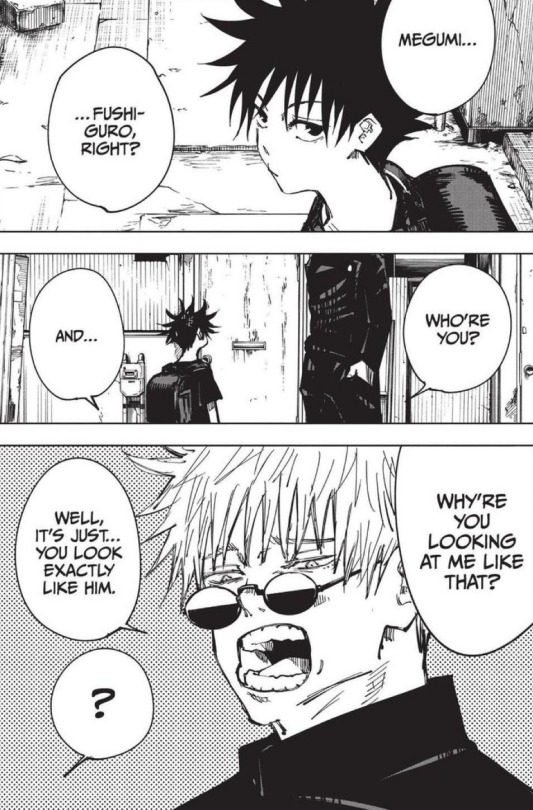
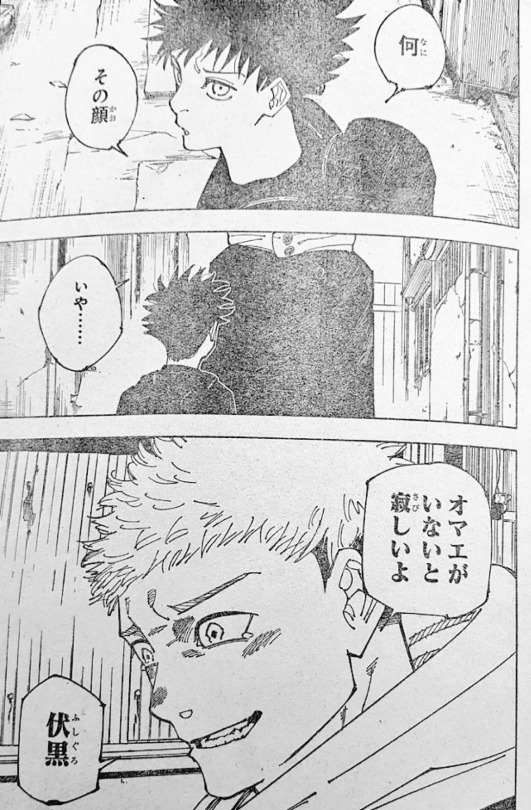
TL;DR: Gojo cares a lot, actually. If Gojo talking about his innermost feelings can't make you empathise, and the students he supposedly "doesn't care about" recognising his burdens can't make you empathise?
Well, that says far more about you than it does about him.
Come read my fics about this!
In His Shadow explores the ways Gojo keeps his distance from Megumi, who isn't equipped with the tools he needs to reach him but finds his own ways to show he cares, born from ten years of history together.
Rivers Crossed, Mountains Scaled explores Gojo and Megumi's relationship through the vehicle of SatoSugu — why Gojo took him in, whether Gojo really gave him a choice, how Gojo sees him.
Hope you enjoyed the post! I love you, Gege Akutami ♥️
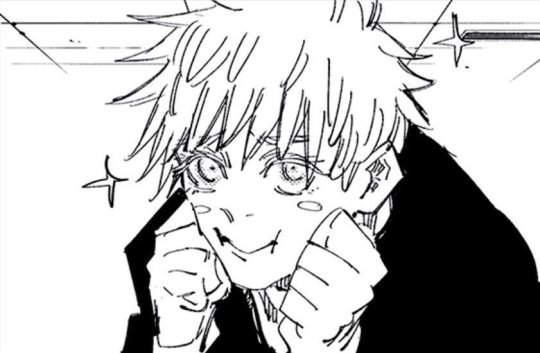
#jujutsu kaisen#jjk#jjk 266#呪術廻戦#gojo satoru#fushiguro megumi#jjk spoilers#jjk manga spoilers#jujutsu kaisen spoilers#jjk meta#jjk analysis#jujutsu kaisen meta#jujutsu kaisen analysis#glo's writing#glo's analysis#fushiglow
610 notes
·
View notes
Text

Ah Knives. Classic abuser bullshit - 'You aren't doing what I want so there must be something wrong with you'.
Of course, Knives' evaluation of his brother is a deeply subjective one, and deeply flawed. He considers Vash's attitude towards others nothing but an impediment, even though Vash's empathy has very much saved his hide multiple times. Be kind enough to folks and you too can snag a genetically-modified assassin and a couple of plucky reporters by your side! (If you know anything about what some journalists have to get into for their stories, then you know Meryl and Roberto are far more intimidating then Woowoo in the long term!)
Not that it matters of course. 'Sickness' is just an excuse here. Something to point to in order to justify abuse. And it's not just limited to Knives. It's rhetoric that extends throughout the Eye of Michael itself, and indeed into many real-life evangelical cults.

'These people are sick, and making them not-sick is more important than then their human rights' isn't just the excuse Conrad uses to torture innocent children. It's the drivel of the Nazis, of the colonists that murdered entire indigenous civilizations. It's the excuse used for conversion 'therapy', and the horrific treatment of people in prisons and psych wards. It's the same abusive bullshit swallowed and vomited up again and again and again.
Actually, speaking of stuff like psych wards, are there any other disabled people who find Knives and co's assumptions about the dependent plants rather... uncomfortable? Specifically:




Knives' attitude towards 'freeing' the plants is that they should be made independent. Removed from their bulbs, removed from human care and made into something that can walk around and do stuff.
Which seems fine and dandy. He's right that the plants deserve autonomy and choice. But it's the core assumption underlying this that's the problem. To him, the plants in their bulbs are also sick. They are sick specifically because they are in their bulbs and can't do what he and Vash can do. Therefore, they must be 'cured', even if it means violating them.
Even though Stampede saves it's critique specifically for the way outsiders take advantage of dependent plants, not plants having to be dependent in the first place. And for all his talk, none of Knives' sisters are asked to weigh in on his grand plans. For all we know, many dependents could be quite happy the way they are and have no wish to be anything different.
To clarify my point, what happens if we reframe this dynamic? What if we were talking about, say, a high support needs autistic person, who literally would not be able to survive without being dependent on others? For people like that, the assumption that liberation and agency must mean independence isn't just untrue, but also something that will (and does!) prove fatal.
See the problem?
#trigun#trigun stampede#trigun meta#tw abuse#tw ableism#yes mr millions I DID just call you an ableist fuck#because you are.#Knives is the kind of dipshit to go up to a paraplegic and complain that they are being 'restricted' by their wheelchair
91 notes
·
View notes
Note
Feel free to ignore if this is too controversial, but do you think there's a reason that C3 has so many "blorbo-centric morality" watchers?
I think it's some hideous mixture of actually interesting character concepts with the parasocial nature of APs/media and just fandom(s) overall seeming to do this, but I was curious if you had any specific thoughts on it
In short: because Bells Hells themselves have a blorbo-centered morality and so they are uniquely relatable to people who choose not to consider perspectives and emotional responses outside of their own. They have an appeal to those who do not extend empathy nor benefit of the doubt nor respect to anyone else, yet act affronted when others openly dislike this, and indeed, validate that. I think past parties at times attracted this kind of fan; however, it became hard to sustain. The people who believed Caleb or Beau were always right couldn’t sustain it when it became clear Caleb or Beau themselves would loathe them for that mentality (or when Caleb or Beau made choices they didn't like and the cognitive dissonance knocked them out), whereas a largely selfish party with a loud Us vs. Them contingent who never really face consequences appeals to well, a selfish sort of person who has an Us vs. Them mentality who thinks they should be above consequences.
I think the most recent episode demonstrates it admirably: Bells Hells come back to the forces of Vasselheim, without whom they would not have made it to Ruidus to scout, who are responsible for it being possible for them to reach Predathos with minimal interruption, and who gave them many gifts and resources, carrying a lethal weapon and telling them they plan to, essentially, ruin their lives. They then mock those same people whose trust they have betrayed. I don’t think this is universally true for the party but several of Bells Hells are, in the end, people who when given the opportunity for gentleness towards outsiders vs. petty cruelty will frequently pick the latter.
I had a very long post planned out tracing the growth of this mentality among terminally online young people but I think that would get tiresome so to keep it short: I think it’s a combination of the longtime internet practice of using identity politics as some sort of Uno Reverse Card while ignoring the diversity of opinions within identities + the idea of activism as identity rather than action (ie, identifying as a feminist or leftist does not mean everything you do and enjoy is feminist or leftist, and indeed, unless you take real-world actions that are feminist or leftist, you identifying as one does not make you one) + the pandemic briefly (and at the time correctly) validating a form of inaction as a virtue and people never moving past that mentality even though it was never universally true in the first place let alone still applicable + similarly a bunch of people now in their early to mid 20s not spending their nascent adulthood having people respond to them being entitled assholes or even just gently but firmly calling them out on their shit and therefore never learning how to act.
The articles in this post are also enlightening, namely, I think a lot of the most blorbo-centric morality types are white culturally Christian people who are really mad that, as this post states, you can’t just point at one POC or non-Christian who validates your position when many of those people in the fandom find the messages of this campaign to be muddled at best; and who get really offended whenever this gets pointed out, for the reasons outlined in the articles. You also see this with a lot of the people who identify very strongly with Ashton and who remark on how if you dislike Ashton you probably would dislike them. This is true. Why do you think random strangers are obligated to like you? Have you done anything to be worth liking? But Bells Hells is a narrative of people whom random strangers are obligated to like so that the plot keeps happening. It is, as this post states, a story about ignoring the wants of the collective in favor of those of yourself. Bells Hells and especially fans do this while simultaneously mocking anyone else for showing a scrap of self-interest (or even, frankly, altruism or empathy towards someone they have decided is The Bad Guy; I think we've crossed a point of no return recently with someone outright mocking another person's post about their personal experiences with colonialism as a tool to quash religion) - a profound "rules for thee and not for me" moral hypocrisy. Bells Hells themselves have a blorbo-centric morality, and those are the fans they attract.
111 notes
·
View notes
Text

*Laughs maniacally as I crack my knuckles*
Y'all mfing know what time it is.
Acotar rant time
And thank you @hieragalbatorixdottir for the suggestion of dicussion.
So straight off the bat, Feyre x Amarantha is better because it's sapphic, which automatically makes it 1000% better than feysand. But for the sake of discourse, we will continue.
Lets discuss Rhysand vs Amarantha's relationship with Feyre.
When Feyre learns of Amarantha in Acotar, she has freshly returned to Prythian, and is shocked to find her lover has been kidnapped and the place she now calls home has been raided and destroyed. Looking like a graveyard.
She is told of Amarantha through Alis who finally reveals everything to her. Along with Amarantha's story, that being of her sister and alluds to Amarantha falling into some kind of insanity from grief.
And Feyre extends empathy towards that. She acknowledges Amarantha's torment for losing someone so close to her. Feyre has sisters and can relate to the kind of pain of wanting to protect them.
When Amarantha and Feyre meet for the first time, there are no shields on their personalities. Feyre sees Amarantha truly and wholly, her whole person on her own terf. Feyre is showing her rawest, most vulnerable self, and is standing right up to her and not backing down. Taking no shit from her.
Amarantha is morally grey and content with her wickedness. She doesn't apologize for the things she does, nor does she try to justify them. She is there for her business and her business alone without any regard for others.
Now lets flip this around. Feyre met Rhysand in very dire circumstances too. She was in a vulnerable, raw environment, in a land she did not know, being threatened to be SAed by three men.
Rhysand came in and saved her, except unlike the meeting with Amarantha he hiding his true self, whereas Feyre is completely on display, shocked and no doubt in some emotional pain from the encounter. So already there is a power struggle right off the bat, except it lacks any real emotion from Rhysand's end.
Rhysand has the similar experience of losing his sister, but he never really shows any real grief for losing his sister, she is more or less a past unfortunate tragedy.
Rhysand is morally grey, but not really because he actually hates it, he was the secret hero all along and whilst he continues to do horrible things unforgivingly, its actually morally right because it's for the 'greater good.'
Comparing Rhysand to Amarantha, and the story Feysand attempts to convey, Amarantha is the better choice.
She is everything Rhysand attempts to be but pulling it off better and with a much hotter attitude.
Even Rhysand steals Amarantha's line 'Feyre darling'. Amarantha also succeeds in her conquests, whereas Rhysand routinely falls flat. Amarantha dreams big whereas Rhysand doesn't seem to have any kind of future really in plan. We see them going from 'we're going to be High King' to 'We'll only show favor to Velaris, and not even the rest of our lands'
Plus Amarantha and Feyre have much better banter, with Feyre being in an incredibly emotional environment and routinely going off at Amarantha, whilst Amarantha takes it all in stride, extremely curious towards Feyre's behavior. Aka, they have good tension throughout the entirety of their interactions.
Amarantha see Feyre go through victory and loss, and keeps throwing challenges at her to push her forward and Feyre throws it right back.
They have a push and pull dynamic that is lacking with Feysand, because Rhysand doesn't push nor pull, he merely exists and Feyre is drawn to him regardless of his actions.
Therefore, Feyantha, is better than Feysand.
#idek where this came from#the depths of my soul probably#acotar rant#anti feysand#anti rhysand#feyre x amarantha#feyre archeron#amarantha#acotar#acotar headcanons
55 notes
·
View notes
Text
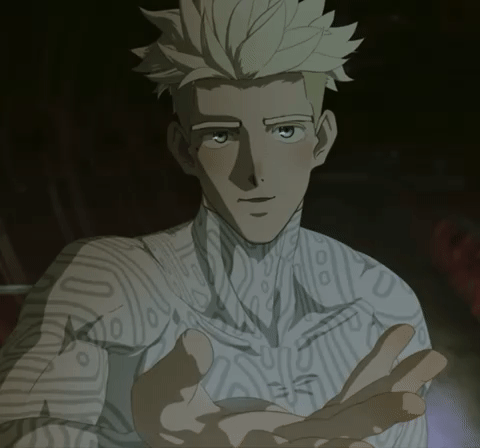
If there was one thing Nai never thought would happen, it's that he'd have any empathy towards a human. When that happened, the new "it will never happen" thought was that he'd fall in love with them. And when that happened too, it was already too late.
Nai's a complex man with many thoughts stored away in his mind. He's tactful. Nothing happens without having deliberately been thought out.
The Great Fall was mentally his undoing. He believed he was doing the right thing. He believed he was giving not only himself freedom, but his brethren. It didn't matter what stood in his way, he would face it and he would be victorious. And when his actions presented fruitful, there was no turning back.
He did what he set out to do. A chain of events were presented to him and there was no other option. A never-ending battle was presented to him and he was the crux. That never bothered him.
What did bother him was when he extended a hand to Rem, his own mother, she chose them instead of him. Whether or not Nai admitted it, he loved Rem in his own way and having her reject them was the nail in the coffin: if his own mother chose the monsters over her own sons, she was also a monster.
And when Vash chose the monsters immediately after, that was enough. The sacrificial act of saving them was not appreciated. That was proof enough that Vash had been manipulated and was too far gone, at least at that point. In time, Vash would come around. In time, Vash would open his eyes... just like Nai did. It was inevitable.
Nai hid his sorrow, burying it deeper and deeper until it was just a fragment of a memory. He might not have even realized he held that grief.
Whatever lingering feelings he had were a waste of time. The love he held for his brother was what drove him to continue, but other than that, he didn't need these useless human feelings. Was he disappointed Vash didn't immediately side with him? Yes. But it would all be rectified eventually, so why process those emotions at all? Nai would always protect his brother.
But that disappointment in both Rem and Vash's rejection would fester in ways he didn't realize.
The fateful day you two met, these disappointments came to light. It doesn't matter how it happened, or what happened at all. One act of kindness or empathy and Nai was immediately hooked, much to his dismay.
He was starved for some kind of positive reinforcement and he would continue to seek it out whether he realized it or not. He was crippled beneath the weight of your actions and surprisingly... he didn't want it any other way.
He spent a long time denying it. You were a human and therefor you were the enemy. He could kill you if he really wanted to... but he never did.
Eventually, he began feeling... empathy for you, something he never thought were possible. Was it an eye-for-an-eye mentality? Because you showed him kindness, he felt like he needed to do the same? Maybe not to the same extent, but...
Maybe it was the looming threat of your rejection. Nai had cared only for two people in the past and they rejected him. Could he handle being rejected again?
He wouldn't give you a chance to reject him. Ever. You want to live? Done. You want an apology? Begrudgingly, it will happen. You want attention? It will be done. You want... love? ... you can have it.
At first, he just believed you were the exception. All humans are disgusting abominations... except you. All the humans needed to die... except you. It took him a long time to accept that your empathy towards him was what made you human. Your humility towards him is what made you human. Your forgiveness towards him is what made you human. And maybe humanity wasn't... all bad...
Maybe a small part of his ideology was wrong.
Maybe.
Begging him to leave everything behind was excruciating. Asking him to give up everything he had worked for and everything he believed was asking him to give up every part of who he was. You were asking him to tear down a century of growth in the (possible) wrong direction. The humans needed to be punished for their misdeeds and he was the messenger. To deny the messenger the act of delivering justice was, in his mind, cruel.
What convinced him was the conceiving of your child. Neither of you knew if you could conceive until it happened. But when it did, there was no denying that he already betrayed his cause. Plants would always be superior. Plants would always deserve more. And humans were a product of destruction, and deserved just that...
... but the middle ground, this child of both plant and human blood, was such a beautiful sight to behold...
And the thought of killing you or the child was something he could not do.
How do you rid the planet of an entire species save two people? Because if you make the exception, where is the line drawn? Humans were filled with flaws such as hypocrisy, and Nai could not fall to these weaknesses else he become exactly what he despised.
So what do you do when you feel you are forced to give up your life's purpose? You find a new purpose.
And finally, the tale of Millions Knives was over. Gone without a trace. The looming threat of his return would always be present, but people could finally breath a sigh of relief... at least for now.
There wasn't a bone in this man's body that knew how to live a domestic life. When you don't need to eat, you don't cook. When you don't need to sleep, you don't dream. There were many things he felt were expected of him that he could not bring to the table. How do you provide what you have not had provided to you for over a century?
Running away from his problems would never be an easy answer. He was forced to lay down a lot of his pride and ego to be able to fit into this... quaint life that he never wished for but so desperately wanted to keep.
But he can learn. If a mere human could do it, so could he.
Eventually, he got used to lying beside you during the night. Despite not needing it, he would sometimes sleep... but most of the time, he'd lie awake and think many a thought.
Did he regret his actions? That was complicated. What he did was for the plants. For his brother. He would never regret his loyalty. He would never regret his beliefs.
But something would always gnaw at him knowing to hate all humans meant to hate you and his child, and he couldn't bring himself to do that.
He would never be able to take back what he had done, and in truth, he didn't want to. Whether that painted him as a villain or not didn't change his mind. He could never adapt a new line of thinking, not entirely.
You knew this. And he knew you knew this.
But the one thing he didn't know you knew... is in the middle of the night when the whole household was supposed to be sleeping, Nai would sneak out of bed.
Maybe it was a need to feel a connection to something he had lost. Maybe the child called to him in a way you couldn't hear. Something drew him from your side during the dark of night that begged him to hold your child.
And with the infant in his arms, the two would glow in the small nursery. The communication between plants that you could not hear but could see. It coloured the room with a dull blue light and lingered in your mind as a beautiful and comforting scene.
Nai would never tell you he did this. And as your child grew and eventually forgot these kindred moments, he would never tell them either. But the message he was trying to convey would always ring true: he would always protect his family.
#Knives headcanons#Millions Knives#Knives x Reader#Knives x You#Knives x Y/N#I got into Trigun knowing I'd be simping for one plant#I didn't sign up for both#Someone PLEASE take one from me#Cause otherwise I will just rant about both of them endlessly and I can't live like this man-#I CAN'T BE SITTING HERE AT THREE IN THE MORNING WRITING STUPID KNIVES FLUFF#But on the other hand y'all liked the glowstick boyfriend? Have two
228 notes
·
View notes
Text
lore and character/class updates from tonight's episode:
Caes Mosor still stands as a massive, 11-story structure in the middle of the ruins of Molaesmyr. The cracks and fissures that run through the streets appear to emanate from it.
There are still bodies here, entangled with roots and mostly skeletal. They have been reincorporated with the voluminous, thriving corruption, creating twisted, almost beautiful murals and sculptures.
UNDEAD TREES!! (note, because I had to look it up: the trees that Caduceus encountered in the A2 crash site did not register as undead when he used eyes of the grave on them.)
There are also spores that permeate the air around the city, all coming from these twisting, vibrantly red trees that have bits of bone protruding from them. Their branches form hands, the bark has a semblance of eye sockets and a mouth. The Bells Hells can't tell if the trees are mimicking corpses, or if they once were corpses.
Frida knows the decompose cantrip!
FCG casts divination, and it appears to work. They hear the wind pick up, and it clears a path through the fog toward Ludinus' tower. Now, divination was among the spells listed by the Vellum Steeple as one that was tried unsuccessfully -- so are the gods settling into a new defensive position, and therefore mortals are able to contact them because they're stationary again? Or is it just that FCG in particular is being shown favor by the Changebringer? And if it's the latter, what does that say about the gods' favor to player-characters, and what does that say about fate and destiny when metaknowledge is considered?
The ghosts are doing a weeping angel thing, closing in on the group whenever they're not being looked at. They are elven in base structure -- angular features, long ears -- but their features are twisted and elongated.
Empathy domain clerics get divine strike instead of potent spellcasting at 8th level, implying that the subclass is more melee-oriented than range-oriented.
A winged creature watches them from Caes Mosor. Frida and Deanna see a creature with thin, leathery wings, with ribbon-like strands that trail from the 35-foot wingspan. Many, many taloned legs extend from the body, and there is no head -- just shoulders, a torso, and a bunch of legs.
The symbol of Molaesmyr is of a white tree, whose branches extend to the sky and whose roots encircle a white sun-like thing that's subterranean. (I'd put money on this being a depiction of a Luxon beacon.) The upper part of the crest is almost identical to the "elven" half of Uthodurn's crest.
Apparently "talking through some stuff" during a short rest can restore FCG's stress points.
Seething Storm is a reskin of either hunger of hadar, storm sphere, or conjure volley.
Dire wolf-like creatures are chasing the party, but their features and faces are elongated, almost like a mole. Their torsos and hinds extend into a serpent-like body that conjoin 30 feet later into one pair of hind legs, like a chariot pulled by 5 wolves.
Wait, Imogen have "infinite sending"? How, and since when?
Regardless, an 89 on a d100 allows the message to go through despite the leyline interference, due to the close proximity between her and FCG.
Deanna summons a spiritual guardian to protect the path they're taking as they climb up the Guildhollow Tower, and it looks like a big, angry, werewolf Chetney.
OHHHHH that creature is a "wolf king," like a rat king!
The inside of Ludinus' tower — the Guildhollow Tower — is mildewed, old, musty. Like the rest of the city, it's been picked through and looted by many, many people over centuries; there are bodies here, the remnants of a camp, all sundered, and much newer than the tower itself.
Has anyone written an academic paper about Matt's use of music in Critical Role, especially in mid-late C2 and C3? and if so, can someone write that? because there's so much mastery there it's insane
Even through the damage this room has sustained, there are elements of very expensive furniture and decoration, as well as patterns and designs that match Ludinus' vibes.
On the next floor, it appears that everything in here is crooked and tilted not because of someone throwing everything against the door, but because things were displaced in the blast. But again, the entire floor has been thoroughly looted.
Despite that, Chetney finds pieces of paper and cloth with elvish writing on them, mostly obscured by the root growth. Some has been torn off and taken, so it's broken up, but Deanna begins to read.
One cloth scroll is notes, self-written annotations, bullet points. "Patterns of arcana across cultures and time, Exandrian calendar patterns, repititions of magic, fonts of arcana that overlap with celestial events... noting where things continue to recur over long and short periods of time." This proves that Ludinus was studying the exact same thing in Molaesmyr as he is today: the movement and cyclical patterns of the leylines. It also bears resemblance to Ryn's research that the M9 found.
Another details "historical specialists, people to reach out to... names like Vatora, doesn't ring a bell; Laerryn, doesn't ring a bell; Vishtaron, doesn't ring a bell... there's also part of a small journal, a series of vellum pages torn from a religious tome. There are circles and notes talking about temple propaganda, inconsistencies and elements of religious rites that are contradictory and in of themselves proof that there is no real truth or plan in what the gods present. It looks like someone is preparing a speech, almost like an Exandrian TED talk, on what is wrong with the religious rites... you notice a heavy emphasis on the Matron, a lot of self-written notes about 'what's her name? I have to find her name. There is power in names.'"
Chetney finds a weird part of the wall, and by casting light at it, Deanna identifies it as an arcane lock that needs magic to open. This is very similar to the locks we saw on doors in Aeorian crash sites in C2. Frida vaguely recognizes the type of lock, but can't remember how to open it.
Chet climbs upward and plants his hand directly into a crimson cocoon, and the entire party watches as something pinkish-red begins to emerge, like an ooze of skinless flesh, a molasses of muscle — faces emerge from it, bestial maws that stretch out from it as it slams onto the stone in the center of the chamber. It has no form, like it hasn't decided what it wants to be yet... "it's drawing inspiration from you and whatever denizens of this city has walked its paths as these arms and tendrils and teeth begin to take form in this mass of chaotic, hungry, insane life that wishes to say hello to the new occupants of this tower."
#critical role#note watches c3#critical role spoilers#critical role campaign 3#critical role c3#critical role liveblog#we've reached the first body horror portion of this campaign!#I loved the last arc of C2 and I love this#and the similarities are DEFINITELY NOTABLE
105 notes
·
View notes
Text
by Dion J. Pierre
Dozens of members of Harvard University’s graduate student union have resigned in protest of its response to the Hamas terror group’s Oct. 7 massacre across southern Israel and what they described as the union “repeatedly ignoring” concerns voiced by Jewish and Israeli members.
Since Thursday, more than 30 members resigned, according to the Harvard Crimson, the campus newspaper. The members were joined by over 70 other Harvard students who signed on “in solidarity” a letter that circulated social media explaining their decision to leave the union.
In the letter, the students said they were “profoundly disappointed” with the union’s actions since Hamas, the Palestinian terror group that rules Gaza, invaded Israel on Oct. 7, massacred over 1,200 people, mostly civilians, and kidnapped over 240 others as hostages. It was the deadliest single-day attack on Jews since the Holocaust.
Rather than pursue a “shared agenda of solidarity,” the union has “repeatedly ignored and derided the concerns of many of its Jewish and Israeli members,” according to the letter. “Despite becoming increasingly vocal on the Israeli-Palestinian conflict, [the union] has at no point acknowledged, let alone condemned, the horrific attacks on Israeli civilians on and since Oct. 7. This refusal to extend empathy to Israeli and Jewish students at a time of escalating antisemitism is a shameful failure of solidarity.”
The students also cited the body’s delay in issuing a statement condemning antisemitism and Nov. 10 endorsement of the boycott, divestment, and sanctions movement, which seeks to isolate Israel from the international community as a step toward the Jewish state’s eventual elimination. Beyond endorsing the BDS movement on Nov. 10, the union also voted to sign a statement calling for a ceasefire in Gaza — a move that critics argue would allow Hamas terrorists to regroup to target Israel.
“Jewish and Israeli members and allies seeking to raise concerns in union meetings about campus antisemitism have been dismissed as ‘privileged,’ told they had ‘nothing at stake, unlike those students with family members now under attack,’ and accused of wielding ‘white supremacist power’ and being ‘complicit in genocide,'” the letter read.
The students noted that the graduate union recently signed a letter that referred to Israel as “the murderous Israeli regime” and accusing it of “ongoing genocide.”
Amid such hostility, the resigning students wrote, they have tried to “engage in good faith” but have reached their limit.
“For the last month we have engaged in good faith,” the letter continued. “At this point, however, it has become abundantly clear that HGSU-UAW [Harvard’s graduate student union] has no interest in supporting the safety and wellbeing of all students impact by the conflict. We are therefore left with no choice but to announce our resignation from the union.”
The graduate union is affiliated with the United Auto Workers labor union (UAW), which represents about 400,000 members including some graduate students and academic workers.
In a statement to the Harvard Crimson, HGSU-UAW Trustee Max Ehrenfreund responded to the resignations.
“These resignations are not merely symbolic, but materially limit the union’s capacity to advocate for its workers,” Ehrenfreund said. “For that reason, we will be reaching out to all of the resigning members to hear from them individually to understand how the union can better serve them and to figure out what we might be able to do to convince them to sign a card again.”
The union’s unofficial “BDS caucus” recently issued a statement deriding efforts to get the union to issue a more thorough statement condemning antisemitism, saying it “feeds into a right-wing narrative that paints the recent wave of protests and consciousness-building in the Palestinian struggle as ‘incidents of incitement and calls for violence against Jewish and Israeli students.'” (Are these a**holes kidding? EY)
Harvard has been a hub of controversy since the outbreak of the Israel-Hamas war, with the school coming under fire for what Jewish and pro-Israel voices have described as allowing antisemitism and anti-Israel hatred to proliferate on campus since Oct. 7.
15 notes
·
View notes
Text
Mastering the Five Warrior Poses: Strength, Balance & Focus in Yoga

The five warrior poses are referred to as the Vira poses or Virabhadrasana series in Indian Best Online Yoga Classes in Ghaziabad tradition. Vinyasa-style classes and modified sun salutations frequently use these standing postures, which are typically sequenced together. The god Shiva created the famous warrior Virbhadra, who is the inspiration behind the names of these positions. Our bodies, souls, and brains are stretched and strengthened by this difficult series of Best Online Yoga Classes. The most well-known — and possibly most beneficial — set of poses in yoga is the Virabhadrasana series.
What are the yoga warrior poses?
The Warrior poses, also called Virabhadrasana in Sanskrit, are among the most popular sets of asanas in hatha Yoga centre in Ghaziabad. Bhadra means “friend,” “blessing,” or “auspicious,” while vira means “hero.” Asana means “posture” in this context. Virabhadrasanas can therefore be referred to be auspicious heroic poses. All of the warrior positions are standing, with arms extended and a broad stance. Although they can be done separately, they are typically sequenced together.
There are 5 primary warrior asanas:
Warrior I (Virabhadrasana I) — The front knee is bent and the hips are turned forward with the arms raised. Warrior II (Virabhadrasana II) — The front knee is bent and the hips are turned to the side with the arms parallel. Warrior III (Virabhadrasana III) — Balancing on one foot, the standing leg is straight and the opposite leg is lifted with the arms reaching forward. Humble Warrior (Baddha Virabhadrasana or Virabhadra Mudra) — The legs are the same in Warrior II, but the torso bows forward with the arms clasped behind. Reverse Warrior (Viparita Virabhadrasana) — The legs are the same in Warrior II, but the arms and torso reach towards the back straight leg.
Mythological story of Virabhadra
Shiva created the warrior Virabhadra with a potent ancient tale, as is the case with all gods and goddesses. The tale mostly stays the same, albeit minor aspects vary depending on the edition. Shiva and Sati were wed. Daksha, her father, disapproved of their union, though. A wounded Sati confronted him after he declined to invite either of them to a large sacrificial feast he was hosting. She was humiliated by her father, who questioned her about leaving her “wild animal of a husband.” Sati decided to end her own life because she was depressed and ashamed. There are other ways to do this, like flinging herself into the flames or meditating until she catches fire.
When Shiva found out what had happened to his wife, he was first devastated and then incensed. He tore a dreadlock from his head and tossed it to the ground out of rage. Virabhadra, a huge being with three eyes, a thousand arms, and a garland of skulls, emerged from the hair. He attended the celebration with the intention of killing everyone, even the gods. After it was finished, Shiva felt regret for the devastation he had caused and his rage transformed into empathy. He brings the gods and Daksha back to life.
Why practice the Warrior poses?
The mythological tale of Virabhadra teaches us that it is important to use our strength, power, courage, and commitment to overcome our feelings of anger, fear, hurt, and insecurity. We take on the heroic and auspicious energy of a warrior when we transform into these warrior shapes. We connect with our strength, self-assurance, compassion, and power as we hold and breathe in these poses. Every warrior pose has unique abilities that can support Yoga Classes In Delhi practitioners on their path to both internal and external change.
Since most of these postures demand a lot of lower body power and have the front leg bent 90 degrees at the knee, they can be challenging for some people. To avoid injury, it’s crucial to understand the proper alignment for these warriors, which are among the most frequently encountered shapes in yoga poses. The benefits of regularly practicing them are numerous and potent.
Conclusion
The warrior postures are a collection of strong yoga poses that improve balance, strength, and flexibility. You can overcome your worries and discover your inner strength with the support of these dynamic and potent poses. These poses are also excellent for developing mental clarity, attention, resolve, and endurance.
Related Article:- Best Online Yoga Classes in Ghaziabad for Health & Wellness
Name: The Yogshala Clinic — ayurvedic doctor in ghaziabad Phone: +91 9811979106 Address: KK-1, Surdas Marg, K Block, Sector 18, Kavi Nagar, Ghaziabad, Uttar Pradesh 201002 Website: https://theyogshala.com/
Original Source
#Online Yoga Classes#Yoga Classes Near Me#The Yogshala Clinic#Yoga Classes In Ghaziabad#Yoga Classes In Delhi
0 notes
Text
The Philosophy of Cosmopolitanism
The philosophy of cosmopolitanism is an ethical and political framework that emphasizes the idea of universal citizenship and global responsibility, advocating for the recognition and respect of shared humanity across cultural, national, and ethnic boundaries. Cosmopolitanism suggests that all human beings, regardless of their affiliations or origins, are part of a single moral community with duties and obligations to one another.
Core Principles of Cosmopolitanism
Universal Humanity: Cosmopolitanism asserts that all people are fundamentally equal and deserving of respect, regardless of national or cultural distinctions. This principle encourages the view that moral concern should not stop at borders or differences but extend globally.
Moral and Ethical Universalism: Cosmopolitans believe in universal moral principles that apply to everyone. These principles are often drawn from the idea that certain rights and values, like human dignity and freedom, are shared by all, thus requiring a global commitment to justice and ethics.
Global Citizenship: Cosmopolitanism encourages individuals to see themselves as “citizens of the world.” This concept suggests that while we may belong to specific countries or communities, we have a responsibility to contribute positively to the broader human community.
Cultural Respect and Diversity: While cosmopolitanism promotes universal principles, it also respects cultural differences. The idea is not to erase identities but to celebrate and learn from them, finding common ground while honoring diversity.
Global Justice and Responsibility: Cosmopolitanism calls for ethical obligations that transcend local or national interests. This might involve addressing global issues such as poverty, climate change, and human rights violations, recognizing that such issues affect humanity as a whole.
Interconnectedness: Cosmopolitanism stresses the interconnectedness of individuals and nations in today’s globalized world, both socially and economically. By recognizing this interconnectedness, cosmopolitans argue that our actions have far-reaching consequences and, therefore, carry global ethical responsibilities.
Influential Thinkers in Cosmopolitanism
Diogenes of Sinope: In ancient Greece, Diogenes claimed to be a “citizen of the world,” challenging the idea of local identity by advocating for a more inclusive vision of community.
Immanuel Kant: Kant envisioned a world governed by universal moral laws and advocated for perpetual peace through international cooperation and respect for human rights.
Martha Nussbaum: Contemporary philosopher Martha Nussbaum has developed a cosmopolitan approach to education and global justice, arguing that individuals should be trained to think beyond local allegiances.
Kwame Anthony Appiah: Appiah’s concept of “rooted cosmopolitanism” suggests that people can maintain local identities while being committed to global moral values.
Cosmopolitanism in Practice
Human Rights Movements: Cosmopolitanism underpins international human rights organizations, which work to protect and promote rights regardless of nationality.
Environmental Justice: Addressing global issues like climate change is inherently cosmopolitan, as environmental issues impact all humans and demand global cooperation.
Migration and Refugees: Cosmopolitan principles influence humanitarian approaches to refugees and migrants, advocating for respect, support, and fair treatment across borders.
Global Education: Cosmopolitan education emphasizes teaching individuals to understand and appreciate global diversity, fostering empathy and a sense of responsibility toward global issues.
Critiques of Cosmopolitanism
Lack of Practicality: Critics argue that cosmopolitanism can be idealistic and challenging to implement because of practical concerns with sovereignty, political structures, and the varied interests of nations.
Cultural and National Identity: Some argue that cosmopolitanism could undermine national and cultural identities, creating a “one-size-fits-all” approach that overlooks local customs and traditions.
Economic Inequality: Critics contend that cosmopolitanism can unintentionally support neoliberal economic policies, which may benefit global elites at the expense of local communities.
Cosmopolitanism’s Vision for the Future
Cosmopolitanism envisions a world where individuals and nations act from a shared commitment to justice, dignity, and equality, fostering a society that balances local identities with universal values. It challenges us to think beyond borders, to act with empathy toward all, and to create structures that promote fairness and understanding globally.
#philosophy#epistemology#knowledge#learning#education#chatgpt#Cosmopolitan Philosophy#Global Citizenship#Universal Ethics#Moral Universalism#Human Rights#Cultural Diversity#Interconnectedness#Global Justice#Environmental Responsibility#Ethical Globalization
1 note
·
View note
Text
Components of the ARC Triangle through a Jungian Lens
Introduction
I just got back from going to a Meetup group that was focused on relational health where they talked about many different therapeutic principles. They introduced the ARC triangle, which comes from Scientology, during this group. It is a model created by L. Ron Hubbard that puts emphasis on Affinity, Reality and Communication as necessary factors for understanding and improving human relationships. Because I wondered how this might intersect with Carl Jung’s work in analytical psychology, I decided to look it up more deeply. His theories of collective unconsciousness and archetypes provide much insight into interpersonal dynamics within relationships as part of his broader framework for understanding them in general through this lens alone should have been enough to intrigue anybody who was listening closely but even so also mine too at least just slightly more than usual given what we were talking about here today – And so if we can somehow manage integrate these ideas together then not only would it lead us towards better comprehension around the whole thing but also open up new areas where such understanding might be applied; or at least that’s what I thought before beginning my investigation anyways. So essentially what I’m aiming for with this project is an attempt at merging some practical aspects found within Scientology together alongside deeper psychological insights coming out from Jungian thought patterns themselves.
Affinity
Affinity within the ARC triangle as viewed through a Jungian perspective is emotional and psychological connection echoing archetypes engrained in people. According to Jung (1964), these connections are rooted in collective unconscious which serves as a storehouse of inherited human experiences and archetypes. Such affinity may be manifested when similar archetypal patterns occur invoking natural ties between individuals. The resonance – not only emotional but deeply psychological- that creates these connections can shape interpersonal dynamics. A more essential type of closeness can be reached by intuition and empathy between individuals leading to deeper relationships. Jungian theory implies that acknowledging and connecting with these unconscious elements may enhance emotional bonds that are critical for meaningful relationships, thus, exploring affinity from a Jungian standpoint encompasses understanding how our emotional links are shaped by affectional influences of archetypes and contents of the collective unconscious.
Reality
In terms of jung’s point, reality in the arc triangle refers to shared understandings or agreements on symbolic or archetyapl levels among two or more persons. Symbols were highly valued by Jang (1959) in accessing deeper layers of psyche which formed basis for common reality perception. This common reality transcends factual agreement into mutual acknowledging complex often subconscious mental processes. Incorporating such symbols will lead to greater degree of mutual understanding among people involved. This jungian notion about reality suggests that true accord should bring together internal worlds of various individuals through using common symbolism language within them; this way communication becomes stronger improving understanding therefore allowing genuine interactions between people.So, establishing a shared reality in Jung’s terms means aligning ons inner symbolic landscapes so as they can deepen ad enrich our interpersonal connections.
Communication
According to Carl Jung, communication involves more than just exchanging conscious ideas; it extends to sharing subconscious contents and emotions. He posited that proper communication goes beyond the conscious mind into the unconscious where our true intentions and feelings lie (Jung, 1960). In light of this, good communication must therefore connect the different parts of an individual’s psyche between awareness and unawareness thus fostering deeper comprehension as well as relationship. This process encompasses not only words but also symbols’ meanings and emotional undertones attached to them which are expressed or interpreted during conversations. Such an approach helps people align their worlds better thereby strengthening their closenesses too. Implied by this theory is the need for honest understanding through integration of hidden messages into dialogue in order to achieve genuine connection based on Jungian thought. Thus, making improvements towards communications from jungian perspective means creating a climate that allows for open sharing of both manifest and latent materials.
Interrelationship in the ARC Triangle from a Jungian Perspective
Enhancing Communication in a Jungian context means more effectively bridging the conscious and unconscious realms, which enriches both Reality and Affinity. By conveying not only conscious ideas but also unconscious feelings and symbols, individuals can achieve a deeper mutual understanding and connection. Increasing Affinity, according to Jung, involves recognizing and resonating with the archetypal patterns that emerge in interactions, which enhances communication and establishes a stronger shared Reality. This shared reality is not just about agreeing on external facts but involves aligning deeper psychological and symbolic understandings. Such alignment facilitates not only better communication but also strengthens the emotional bonds between individuals, thereby enhancing overall relational dynamics. Therefore each component of the ARC triangle supports amplifies others thus leading to holistic improvement in interpersonal relationships.
Conclusion
Looking at affinity reality communication triangle through jungian psychology lens allows us see how these three elements interact within human relationship systems . When we take into account collective unconsciousness from Jung’s work alongside archetypal patterns as seen in ARC configuration ,it becomes clear that there is more depth to interpersonal dynamics than what meets eye. This approach not only connects two major psychological perspectives but also enables people have closer and meaningful connections with others. Exploring these ideas either during therapy or personal growth can enhance one’s self awareness while dealing with other people . Therefore as we continue investigating on these points it will help us understand better relational health practices thus giving us applicable tools towards our own development as well as professional therapeutic intervention.
References:
Jung, C. G. (1959). The archetypes and the collective unconscious. Princeton, NJ: Princeton University Press.
Jung, C. G. (1960). Psychological aspects of the mother archetype. Princeton, NJ: Princeton University Press
Jung, C. G. (1964). Man and his symbols. London: Aldus Books.

0 notes
Text
Sculpting Success: How Art Education Shapes Children's Abilities?

Art education plays a crucial role in the overall development of children. It goes beyond just being a creative outlet; it has numerous positive impacts on their cognitive, emotional, and social well-being. This blog explores some of the key benefits of children learning art.
Firstly, Art Class in Brisbane enhance cognitive development. Engaging in artistic activities stimulates the brain and encourages critical thinking skills. When children participate in art classes, they are encouraged to observe, analyze, and interpret the world around them. This process helps them develop problem-solving abilities and enhances their visual-spatial skills. As well as promoting imagination and creativity, art encourages children to think outside the box.
Secondly, art education has a positive impact on emotional development. A child's emotions can be expressed safely and expressively through art. Through various art forms, children can channel their feelings, whether it be joy, sadness, or anger, into a tangible creation. This process helps them develop emotional resilience and self-awareness. Moreover, engaging in art activities promotes relaxation and reduces stress levels, allowing children to express themselves freely and find solace in their artwork.
Thirdly, to cognitive and emotional benefits, art education also fosters social development. Art class in Brisbane provide children with opportunities to collaborate, communicate, and interact with their peers. Whether it be through group projects or art exhibitions, children learn to share ideas, listen to others, and work together towards a common goal. This cultivates their social skills, such as teamwork, empathy, and respect for others' perspectives. Art also acts as a universal language, transcending cultural and linguistic barriers, allowing children from diverse backgrounds to connect and appreciate each other's artwork.
Fourthly, learning art nurtures self-esteem and self-confidence in children. As they explore different art forms and experiment with various techniques, children gain a sense of accomplishment and pride in their creations. Art classes provide a supportive environment where children's efforts are recognized, fostering a positive self-image and boosting their confidence. This newfound confidence can extend beyond the art classroom and positively impact other areas of their lives.
Conclusion Art education has numerous positive impacts on children. It enhances cognitive development, emotional well-being, social skills, self-esteem, and cultural appreciation. By nurturing creativity, critical thinking, and self-expression, art classes provide children with valuable skills that can benefit them throughout their lives. Therefore, it is crucial to prioritize and encourage art education for children to unlock their full potential.
0 notes
Text
okay this is just gonna be a bunch of rambling so feel free to ignore this cuz it's mostly just me kinda venting and Processing feelings abt being objecto into the void
like okay. i am in a spot where i think i have a very complex relationship w my objecto-ness because of how it is currently manifesting itself in regards to the Clockboy Crush
like in the past, my main crushes that i would consider like, important, and in recent enough memory that they still affect me today, were
Clippy (who is a fictional character; he is sentient in his source but, again, fictional, so he cannot reciprocate feelings)
and Miles (my old car; a real object, but one that I owned and therefore i could essentially project whatever relationship i wanted onto us. realistically, i know he couldnt reciprocate, as he was not sentient irl, but something about him made it seem like he did love me back in a way. it's very complex and hard to explain to literally anyone who doesnt have my brain)
in both of their cases, i would selfship with them, draw them, personify them in certain ways, and have gijinkas of them
i think some extra context that is important is that the relationship i had with Miles is VERY different than the one i have w my current car, Lawrence, who has different vibes to me. like i genuinely get the feeling he only just. tolerates me. lmfao. he is so sexy to me but like, we do not gel like how me and miles did. (which again, is a weird thing to think about and kinda disproves the "oh objectos only want to be with objects because they cant reject them!" mindset in my case like bro why would i "headcanon" my car as not thinking im a sex god he's madly in love with)
anyway this is where the clockboy stuff gets. complex. like. OBVIOUSLY. i have a huge crush on him. i selfship w his objecthead design, and that does extend to his irl version to an extent. obviously, again, i realistically know irl he cannot reciprocate the feelings i have toward him
however... similar to miles, i do get a Vibe from him. there's been some coincidences that seem so specific that it's like. hard to shake that it's not something deeper... and again, i know deep down it's all in my head but at the same time... my hyper empathy toward inanimate objects has always made me instinctively think that most objects have *some* sort of soul.
it's all so complicated and confusing and hard to explain and it's two sides of my brain fighting each other at all times over this. i dont think either side is fully right.
and what sucks is like, when it's about Miles, it's easy to keep to myself and on the down low in a way. i was the only person on earth who would have possibly loved him in that way.... but Clockboy falls into public object territory. while the odds are low that anyone else feels the exact same way toward him, it's not impossible
im not like... opposed to the idea of "sharing" a public object but it's a really complex thing to me. like for him specifically, however, it makes me uncomfortable and i dont... understand why. jealousy is probably the closest word to what i would feel but it doesnt seem entirely accurate.
ive been extremely fortunate to see him irl more lately, and have had a couple experiences that i cant fully disclose (for privacy reasons. nothing weird, i promise. like if i got to be any physically closer than any other guest to him, you would already know it by now. but, just know i have connections and dont want to jeopardize things for anyone lol). like i mentioned there's just been a vibe to him. like part of me does think it is something deeper. but then i question if it's something he would do for anyone else... it's so hard to know.
i'd like to think im special to him, somehow. if he can feel that way about people. he is special to ME, and i just wish i could tell him and have him know it. i would give almost anything to have like, 2 minutes of back and forth communication between us to make sure he knows that.
at the end of the day i know none of that really matters and i should do what makes me happy. like spending time near him is "enough" for me i guess. i know i will never get to be any closer to him than someone standing near him in the queue line. i can never have any form of intimacy with him, no form of privacy. i will never get to own him in a way that lets me be with him everyday in a way that would "matter"
anyway i know this like. is not "normal person" behavior and i know this isn't like. entirely healthy mindsets to have. 90% of the time i dont even like, think about this stuff this deeply but it's on the mind tonight...
im not trying to like, compliment fish or anything, but the reason im posting it is i guess if any of my objecto followers have any like. words of advice or reassurance or something about public objects i wouldnt mind if u sent them my way
(also im kinda in therapy again so if i post this here, if it starts eating away at me, i can find my Thoughts again to read to my therapist if i ever tell her im objecto lmfao)
#vent / kinda#like i said. this is a rambly mess#unpacking some brain baggage about objecto shit#i genuinely wish i had more concise words about this stuff...#also i mention in there abt other objectos reaching out...#...and that's kinda who i would prefer reaching out. i dont think non-objecto ppl can like. fully grasp this#if u can. great. if u cant. i get it lol#also also i mention intimacy w/ a certain something and i promise on my life i am not implying anything more than like. making out w it and#even that is a bit of a stretch.#the sex part of objectosexuality for this Thing is like. nonexistent.#anyway. hi. sorry for oversharing. i was unmedicated for 24 hrs#and this is what happens i guess.#time for bed now
9 notes
·
View notes
Text
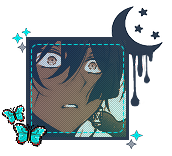
Came to a realization earlier today at work that nothing scares Sovann (both in default verse & genpact verse) as much as a kind deity.
I could easily extend that to kind individuals in general, but considering their (insofar) fraught relationship with the divine and those perceived as divine, a kind deity is nothing short of terrifying for them. Cruel gods, impartial gods, distant gods, ambivalent gods, fair gods, quiet gods-- they know how to contend with those well enough. They won't default to violence the way they were taught purely out of spite, but that doesn't mean they won't antagonize. The genuinely kind ones, though, the ones who handle all matters in grace, who prioritize their followers but welcome those not of their faith with open arms regardless, who can look at filth and offer a gentle smile, those are the ones that petrify them to the point of immobility. Especially if that kindness is extended towards them. The fear doesn't creep in. It grips them all at once, it strangles them and fills them with nothing but frigid terror and panic. Because... why? Why, then, did all that have to happen? How are they supposed to contend with knowing kindness did (and does) exist, and yet things ended the way they did for both them and their siblings? Logically, they cannot wrap their head around that such cruel fates weren't deserved. Lowly creatures born of sin and night should be conquered, not cared for. Even if they refuse to accept that's how they were naturally born, that's what they were inevitably molded into. They should claw their way through all the wrong in the world to earn scraps thrown off the table. But they also deserve everything good in the world, don't they? A kind deity only further exacerbates the paradoxical dichotomy that they are stuck in: I am nothing and therefore I deserve everything, I am everything that could have been and therefore deserve nothing.
It also exacerbates their maladaptive responses to what most regard as basic social etiquette/empathy. They were conditioned to revile a world they wanted (and still desperately do want) to love. It makes them want to bite, maim, kill. Ironic, considering it would prove those long-dead false gods right. The only thing that would hold them back from going for the throat in those moments is that fear. What comes after kindness? They don't know. And it's not the unknown they fear, but the prospect of finding out. Naturally curious as they are, there were a great many things that were off-bounds for them-- that was chief among them. And it would be betrayal of the worst kind, wouldn't it, to thrive at the cost of the mercy they gave their siblings with sliced throats?
I know it's a bit of an elementary observation given the types of trauma Sovann holds, but kindness really does scare them. They don't know how to hold it. Especially not from anyone divine or anything touched by divinity. And, well, isn't nearly anything in the world touched by divinity in some way or another?
#about : sovann#* me: yeah this will be a short post so it's okay to break my weekends-only rule for it#* me now: hmm hmm. lots of words#* i just get so caught up in thinking about how paradoxical sovann is. how difficult they are#* they do want to be impossible to deal with but also they don't#* they crave companionship after isolation and abandonment but the idea of steadily being known-#* it makes them want to tear their own skin off or tear out another person's throat#* basically what i am saying is i want sovann to put their hand in another hand. loveable or not#* their grip will probably break skin#* but in time they'll lick the wounds they make on you. they'll make a salve that never runs out#* they know they leave marks on everything but god as insufferable as they can be can u really blame them#* if they don't leave proof they were there what's going to disappear next#* they will make their own sins against u better. they will. let them do it for u. let THEMMMMM
10 notes
·
View notes
Photo

Shipping with the Joker && Joker’s Sexuality
Joker essentially views people as mostly objects (she possesses very little if any human empathy), and therefore any person is a potentially sexual object insofar as they fulfill certain prerequisites (ie: physical attractiveness, flexible morality, willingness to take direction, threshold for violence, etc.). Subsequently, Joker can instantly become sexual with any person who hits these particular buttons for her– it doesn’t necessarily mean she plans to fuck this person, or even wants to fuck this person. I mean, it could mean she wants to fuck them, or it could mean she’s using her sexuality to manipulate them, OR it could mean she’s briefly considering how they might look suspended from the ceiling in a studded leather harness getting publicly gang banged by men in clown masks for her viewing pleasure. Who can say?? Joker’s sexuality is a bit like Schrodinger’s cat, in that she both does and does not want to fuck someone… until the time comes to open the box, and it is what it is.
Hence, Joker is likely to be sexual, or sexually intense, or say dirty things, or inappropriately touch (with the mun’s permission, ofc) another muse. It doesn’t necessarily mean she’s trying to get with them or start a ship or what have you. So I guess heads up (pun fully intended).
This brings me to my next point: on shipping. Joker may take a shine to someone and start fucking them regularly, but it doesn’t necessarily mean she’s developed any sort of emotional attachment to them. Often, her sexual partners are just talking sex toys to her.
If she does develop affection towards another human being (which does happen on occasion), sex does not necessarily have to be involved (it can, but it isn’t necessary). It really only means that this is her person now, and if anyone fucks with her person, it would be like someone threatening to key Joker’s car. I mean, can you imagine if some asshole was like “heyo, I’m gonna key your car”?? They’d have about six bullets in them before they hit the ground. Don’t fuck with her shit. Don’t fuck with her people, don’t fuck with her business. It’s not really out of a sense of chivalry so much as it is a bizarre ownership, and it may often extend to people within her employ.
Joker is capable of loving someone. It would be a very shallow love, though, and it would never, ever be healthy. I did originally develop this blog to ship with a Harley Quinn that no longer exists, so I do largely have that understanding of how a relationship, a real romantic relationship, with the Joker could theoretically work. Joker could love someone: if they were persistent, if they were absolutely devoted to her, if they would do ANYTHING for Joker and still were smart enough and deadly enough not to have to rely on her. But it would take a very twisted mind with an appetite for (self) destruction in order to get there.
6 notes
·
View notes
Text
I feel like I can’t stress enough how important Spinner is to the ‘My Villain Academia’ arc, and how badly I need BONES to give him the attention and care in portraying him that he deserves. BONES have been pretty faithful to the manga, they’ve followed the story and brought each scene on the page to the screen... Except for some reason not when it comes to the Villains. Maybe it’s because arguably the Villains wasn’t the focal point of the show and they weren’t what most viewers watched the show to see; fine, but that was the case in the beginning and no longer.
Shigaraki Tomura, his exploits, his character, his story *is* the manga: the Heroes and protag react mainly to him and his actions, his past and motivations is one of the main factors that caused the current central conflict, and resolving his character arc is what will probably bring the whole series - to its end or near end. Yeah, imo I argue that everything about him moves the plot along.
Unfortunately(?), I think Horikoshi-sensei realized/decided/planned this a bit too late in his pacing. He said himself during the Stain arc or so that at first, he wasn’t planning on doing villain profiles - he wanted the villains to be scary.
But for the time being, I have no intention of writing about [the villains]. I do the introductions because l personally like those sorts of behind-the-scenes things, and also because I want my readers to feel a connection to the characters. But with villains, I decided I can't have them too likable. They're supposed to be terrifying.
Often it’s what we don’t know/understand/predict/expect (and therefore can’t get a grasp on) that makes things scary/uncomfortable/dislikable. The Villains were strange, seemingly erratic and incomprehensible in their behavior and motivations, malicious without rhyme or reason. Even now, I think a lot of people still think they’re just ‘completely evil crazy psychopaths’.
Anyways, the quote from him is from Volume 7. A whole bunch of volumes later in Vol. 23, he decided nvm: “The story has evolved beyond that point, so I'm ready to start doing villain profiles.” As he said himself, the profiles are to help the readers connect with the characters, make them relatable and likable. That’s what My Villain Academia is all about in the meta sense - to demystify Shigaraki Tomura and his ragtag chaos friends, to give them depth, and to induce interest in their stories, if not sympathy. Hype them up for the rather major roles they play in this ‘final arc’ of the series.
Enter Spinner, the lizard ninja guy.
Besides his unusual looks, Spinner is really, truly nothing special. He’s got a weak quirk, he holds no title of being the strongest or smartest or whatever member of the League, he’s not related by blood or thematically to any major players in the main conflicts, and his ‘tragic’ backstory is completely mundane compared to his allies - he was bullied as a child, and so is fueled by resentment. In the events leading up to the start of the arc, Spinner is the most moral and understandable of the Villains - has a ‘good’ reason for his crimes (eradicate corrupted Heroes), has standards on who he’s willing to fight (questions attacking the police and anyone with a ‘true heroic spirit’), and wants a concrete game plan instead of aimless discord the rest of the League seems alright with.
Once the arc starts, we immediately learn the basics of his character - he’s got a heteromorph quirk that makes his appearance a humanoid gecko and it’s something he was born with that he can’t control, and yet he faces discrimination from literal KKK-type cultists who refuse to see him as human. This was more or less his life in his small, rural hometown, harsh enough that his heart had become ‘completely empty’. It’s simple, it’s relatable and an realistic analogy anyone who has faced prejudice and harassment and been hurt by it can understand.
All this is so Spinner ends up being the most normal and typical sympathetic of the League of Villains, which sets him up to be a sort of ‘gateway Villain’. It’s why he’s narrator. He doesn’t understand at all the crazy All For One shenanigans, he’s thinks Shigaraki is an incompetent weirdo, and he asks what we were all thinking: “Shigaraki Tomura, what the fuck are you doing.” Quite obviously, Spinner’s meant the audience surrogate and so he is. That being a core of the way the story of My Villain Academia is told means it needs be followed by the anime adaption.
This core sets up the rest of the arc - sets up how we will come to view Shigaraki Tomura and his backstory, alongside the rest of the League Villains, their relationships and dynamics with each other, and who they are at heart. Shigaraki’s telling of his distorted origins in Chapter 222 is horrifying as it is already; but it’s Spinner’s worried-facial-expressions reactions littered throughout the chapter that adds to it by telling us one major thing: Spinner’s an empathetic guy, because he immediately feels a kindred spirit with Shigaraki when the latter talks about the hollowness he feels. So begins the audience surrogate’s change of opinion and us readers going along with it, and also: that Shigaraki Tomura now has Spinner’s concern and attention - and is deserving of it.
Pardon the sudden heavily edited quote, but CS Lewis says,
Friendship arises...when two or more of the companions discover that they have in common...which, till that moment, each believed to be his own unique [burden]. The typical expression of opening Friendship would be something like, "What? You too? I thought I was the only one." ...And instantly they stand together in an immense solitude.
That’s almost word for word Spinner in that moment, suddenly realizing he’s no longer as alone as he thought. He’s no longer as alone, and this means perhaps neither should Shigaraki. Because established in that very chapter, too, is the hate in Shigaraki’s heart fueled by his grief and despair, the loss of his family, past, and faith in others, his misery of thinking he’ll never feel good again. Yet - there’s Spinner, willing to extend some empathy and care, the very antidote to all that Shigaraki had revealed. Because the desire for companionship (or at least the lessening of the pain of loneliness) is universal, even among villains - maybe especially among these villains - we probably love to see it. Want to see it.
On that basis - friendship borne out of empathy - Spinner puts his faith his leader, puts his trust and support, and the rest of the arc is us following the tension of whether he was right to do so. Whether Shigaraki would live up to what Spinner expects of him, whether Spinner will side with Shigaraki despite their earlier conflict. Whether they could become friends, or something like that. And once they do, the consequences of this as things spiral more and more out of control, beyond this arc - that Spinner would know Shigaraki well enough to do something crucial at the turn of a battle later, that Spinner would stick by Shigaraki’s side when he’s in danger, that Spinner is loyal enough to Shigaraki to help him as a friend should.
Through Spinner, we come to see Shigaraki, originally incomprehensible and terrifying, as someone beyond a Villain or a leader, but rather someone valued as a person, a friend, a fellow silly gamer nerd. He’s still scary, of course - just less so, with a seed of doubt of his doom that Spinner - and only Spinner, by virtue of his specific narrative and emotional role in this arc - planted in their characters and the story.
It’s because of Spinner that MVA works, by itself, and as a stepping stone towards the rest of the series. So he really needs to be everything he is, was, and more in the anime adaption please BONES oh my god please
#long post#nalslastworkingbraincell#shigaraki tomura#bnha#mha#heroaca#Spinner#Iguchi Shuuichi#my interpretation of course#but like#everything I said is right there in the text and can be convincingly argued for#so I’m right and it’s mandatory that BONES listens to me
401 notes
·
View notes